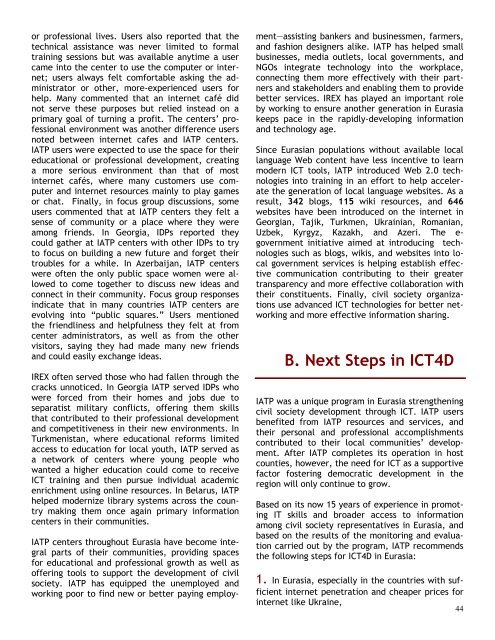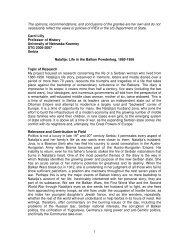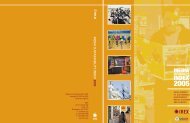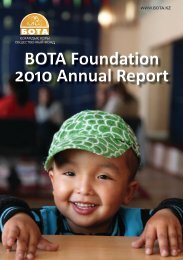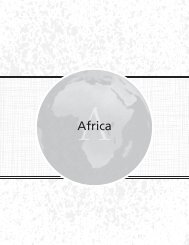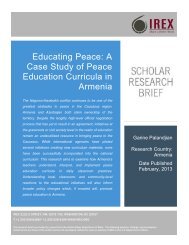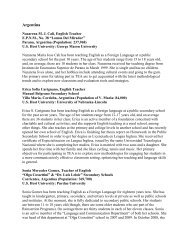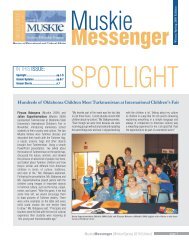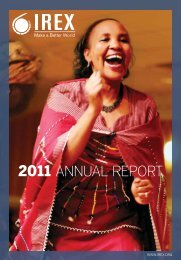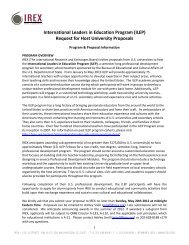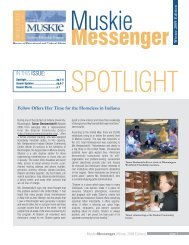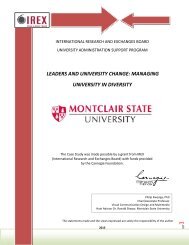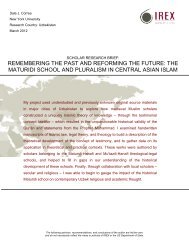IATP Monitoring and Evaluation Report - IREX
IATP Monitoring and Evaluation Report - IREX
IATP Monitoring and Evaluation Report - IREX
You also want an ePaper? Increase the reach of your titles
YUMPU automatically turns print PDFs into web optimized ePapers that Google loves.
or professional lives. Users also reported that the<br />
technical assistance was never limited to formal<br />
training sessions but was available anytime a user<br />
came into the center to use the computer or internet;<br />
users always felt comfortable asking the administrator<br />
or other, more-experienced users for<br />
help. Many commented that an internet café did<br />
not serve these purposes but relied instead on a<br />
primary goal of turning a profit. The centers’ professional<br />
environment was another difference users<br />
noted between internet cafes <strong>and</strong> <strong>IATP</strong> centers.<br />
<strong>IATP</strong> users were expected to use the space for their<br />
educational or professional development, creating<br />
a more serious environment than that of most<br />
internet cafés, where many customers use computer<br />
<strong>and</strong> internet resources mainly to play games<br />
or chat. Finally, in focus group discussions, some<br />
users commented that at <strong>IATP</strong> centers they felt a<br />
sense of community or a place where they were<br />
among friends. In Georgia, IDPs reported they<br />
could gather at <strong>IATP</strong> centers with other IDPs to try<br />
to focus on building a new future <strong>and</strong> forget their<br />
troubles for a while. In Azerbaijan, <strong>IATP</strong> centers<br />
were often the only public space women were allowed<br />
to come together to discuss new ideas <strong>and</strong><br />
connect in their community. Focus group responses<br />
indicate that in many countries <strong>IATP</strong> centers are<br />
evolving into “public squares.” Users mentioned<br />
the friendliness <strong>and</strong> helpfulness they felt at from<br />
center administrators, as well as from the other<br />
visitors, saying they had made many new friends<br />
<strong>and</strong> could easily exchange ideas.<br />
<strong>IREX</strong> often served those who had fallen through the<br />
cracks unnoticed. In Georgia <strong>IATP</strong> served IDPs who<br />
were forced from their homes <strong>and</strong> jobs due to<br />
separatist military conflicts, offering them skills<br />
that contributed to their professional development<br />
<strong>and</strong> competitiveness in their new environments. In<br />
Turkmenistan, where educational reforms limited<br />
access to education for local youth, <strong>IATP</strong> served as<br />
a network of centers where young people who<br />
wanted a higher education could come to receive<br />
ICT training <strong>and</strong> then pursue individual academic<br />
enrichment using online resources. In Belarus, <strong>IATP</strong><br />
helped modernize library systems across the country<br />
making them once again primary information<br />
centers in their communities.<br />
<strong>IATP</strong> centers throughout Eurasia have become integral<br />
parts of their communities, providing spaces<br />
for educational <strong>and</strong> professional growth as well as<br />
offering tools to support the development of civil<br />
society. <strong>IATP</strong> has equipped the unemployed <strong>and</strong><br />
working poor to find new or better paying employment—assisting<br />
bankers <strong>and</strong> businessmen, farmers,<br />
<strong>and</strong> fashion designers alike. <strong>IATP</strong> has helped small<br />
businesses, media outlets, local governments, <strong>and</strong><br />
NGOs integrate technology into the workplace,<br />
connecting them more effectively with their partners<br />
<strong>and</strong> stakeholders <strong>and</strong> enabling them to provide<br />
better services. <strong>IREX</strong> has played an important role<br />
by working to ensure another generation in Eurasia<br />
keeps pace in the rapidly-developing information<br />
<strong>and</strong> technology age.<br />
Since Eurasian populations without available local<br />
language Web content have less incentive to learn<br />
modern ICT tools, <strong>IATP</strong> introduced Web 2.0 technologies<br />
into training in an effort to help accelerate<br />
the generation of local language websites. As a<br />
result, 342 blogs, 115 wiki resources, <strong>and</strong> 646<br />
websites have been introduced on the internet in<br />
Georgian, Tajik, Turkmen, Ukrainian, Romanian,<br />
Uzbek, Kyrgyz, Kazakh, <strong>and</strong> Azeri. The e-<br />
government initiative aimed at introducing technologies<br />
such as blogs, wikis, <strong>and</strong> websites into local<br />
government services is helping establish effective<br />
communication contributing to their greater<br />
transparency <strong>and</strong> more effective collaboration with<br />
their constituents. Finally, civil society organizations<br />
use advanced ICT technologies for better networking<br />
<strong>and</strong> more effective information sharing.<br />
B. Next Steps in ICT4D<br />
<strong>IATP</strong> was a unique program in Eurasia strengthening<br />
civil society development through ICT. <strong>IATP</strong> users<br />
benefited from <strong>IATP</strong> resources <strong>and</strong> services, <strong>and</strong><br />
their personal <strong>and</strong> professional accomplishments<br />
contributed to their local communities’ development.<br />
After <strong>IATP</strong> completes its operation in host<br />
counties, however, the need for ICT as a supportive<br />
factor fostering democratic development in the<br />
region will only continue to grow.<br />
Based on its now 15 years of experience in promoting<br />
IT skills <strong>and</strong> broader access to information<br />
among civil society representatives in Eurasia, <strong>and</strong><br />
based on the results of the monitoring <strong>and</strong> evaluation<br />
carried out by the program, <strong>IATP</strong> recommends<br />
the following steps for ICT4D in Eurasia:<br />
1. In Eurasia, especially in the countries with sufficient<br />
internet penetration <strong>and</strong> cheaper prices for<br />
internet like Ukraine,<br />
44


